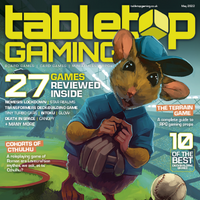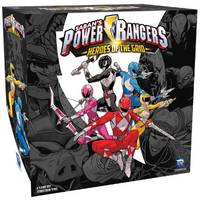05 May 2022
|
Ave Cthulhu
Words by Richard Jansen-Parkes
“I’ve always had a fondness for mythology and ancient legends,” says Douglas Seacat, a longtime writer at Privateer Press and veteran of the tabletop gaming sector, “the idea of putting some of those ideas, those stories, in an RPG really appeals to me.”
Today, Seacat is sitting down to talk about his latest, as-yet-unreleased project. Alongside him is Chris Birch, Chief Creative Officer at Modiphius, who is sharing slides of concept art and descriptions of plot-central characters for their upcoming game.
The slides the duo are excitedly flicking through show warriors in iconic armour of the Roman Legions, armed with gladius and pilum and everything else you read about in your history class. The creature they face off, however, is unlike anything you’re likely to have encountered in school.
Unless, of course, one of your English Lit classes segued into the back catalogue of H.P. Lovecraft for some reason.
“Working in the Cthulhu Mythos allows us to play with the idea of the Roman and Greek gods having some real, genuine impact in the world,” explains Seacat, “even if it isn’t necessarily a positive one…”

Gleaming Cohorts
The game that Birch and Seacat are showing off, in their roles as creator and lead writer respectively, is the gloriously titled Cohorts of Cthulhu.
You might like to think of it as a spiritual successor to their madcap World-War-II-but-with-Mythos game Achtung! Cthulhu, but with the setting swivelled away from the battlefields of Western Europe and towards… well, also the battlefields of Western Europe. But some 1,800 years earlier.
“We picked Germania because it’s D&D-land,” laughs Birch. “Its cold, wet forests, its borderlands, its frontier forts, its hairy barbarians hiding in the woods.”
“Have you ever run the classic old module Keep on the Borderlands?” he asks, “think that. But everyone is wearing roman armour. There aren’t any elves, but you might run into ancient Atlanteans. There are no wizards, but you might meet priests of mysterious cults with strange powers.”
“There are a lot of similarities between our slice of Germania and your typical classic fantasy settings,” he adds. “It’s a world that will feel very familiar to gamers.”
As with Achtung! Cthlhu, the game looks to slip its way into the shadows of an existing conflict – namely, the endless skirmishes between the forces of Rome’s northern frontier and the ‘barbarians’ living in the forests beyond. However, this time around the forces of the Mythos entities are being much less subtle. And it’s not like they were particularly sneaky to begin with.
“Essentially, you’ve got this idea of a cult that’s bringing evil forces together, against the Roman empire,” Birch explains, “they’re starting this war deep in the forest, and start converting Roman soldiers into Servitors of Nyarlathotep – horrible things with tentacles instead of heads. They start to launch their war towards the Roman forts, which is where the story picks up.”

Two Games, One Story
This is where things start to get a little complicated, though. You see, as with Achtung! Cthulhu before it, Cohorts of Cthulhu isn’t content to sit within just one game. Instead, Modiphius are releasing two games simultaneously.
One, a skirmish wargame that shines a light on the more explosive, more dramatic elements of the story. The other, a more mystery- and exploration-based tabletop RPG set just before the war erupts onto the scene.
“It’s a dual-tracked project,” explains Birch, “there’s going to be a big RPG release and a big wargame release. It’s up to you whether you play one or both.
“If you want to leap right into the battles, you can jump into the wargames solo or co-operative. Either way you’ll be playing a campaign against a very difficult enemy.”
“On the RPG front,” says Seacat, “we’re creating a starter town – Laurium, on the northern frontier – and starting adventurers and planting seeds. But, we want to empower the GM to jump forward or backward in town, modify things and explore this ancient world in a variety of ways.”
“We start with this one location in Germania, but we want to then expand things so you could set a game in Egypt or Brittania or Syria.”
Cunningly, the Modiphius team has decided not to pour resources into creating a huge range of models for ordinary soldiers and Roman-era warriors.
“Wargaming in the Roman Empire has been very popular over the past few years,” notes Birch, “so we’ve scaled the miniatures to 28mm, which is historical scale. We’re not aiming to make Roman soldier #2456, we’re focussing on characters and monsters – things you won’t get in normal miniature games.”

A Monsterous Intelligence
Many of the details of the Cohorts of Cthulhu wargame remain in development, but one of the decisions Birch and Seacat made very early on was to focus the entire game around a solo or co-op experience. When you play the game, it’s as the human heroes against the Mythos horde, and not the other way around.
This decision fits neatly with the themes of the game, but it has required the team to pour their creativity into developing a tabletop AI system that doesn’t require you to, as Birch puts it, “roll on 27 different tables to find out that, oh, the enemy attacks you.”
“That’s just boring,” he declares.
“We’ve invested heavily into games with good AI mechanics. Fallout: Wasteland Warfare is probably known as one of the better tabletop AI systems out there. That has a system where each type of unit has its own AI responses, that is often very different to just attack, attack, attack. In Cohorts of Cthulhu different types of creatures will have different objectives.”
Birch says that the Modiphius team has been working hard on a system that prioritises simplicity. It allows the enemy to appear to make smart, unpredictable decisions, but doesn’t require mountains of rolling the rulebooks to run.
“One thing with the AI is that we can fake very complex mechanics with pretty simple rules,” Birch explains, “the interesting thing isn’t how the enemy gets from A to B on the map, but how a unit turned up at B and surprised you. The AI isn’t going to just be about killing you, but about achieving objectives.
“The fun part isn’t just having monsters try to kill you. The fun lies in having them attack your HQ or capture your commander. Do you head to the temple to stop them from summoning some horrible monster, even if that means leaving a couple of your troops behind?”

Changing Up Characters
The wargame isn’t the only aspect of Cohorts of Cthulhu that’s getting a rules polish. Though Birch notes that the RPG “is a very close sibling to Achtung! Cthulhu” and will use the same 2d20 system, the designers are going to “try out some different mechanics.” A lot of these are about making it easier to get your games started.
“I’m a big believer in character creation in play,” smiles Birch. “I know that a lot of people start an RPG and then, a few sessions in, start to regret their choices. They look over at their friend and say ‘oh, he’s having so much fun with magic - I don’t know if I want to just be a fighter.’
“So, we’re introducing a couple of mechanics to the game. Firstly, we’re letting you keep some of your choices a secret until you choose to reveal them. You just leave some of your character sheet blank until you make a decision - you might have the woman in the armour say ‘hey, I never said I was a gladiator’ and then pull out some totally unexpected skill.”
“It lets you evolve your character on the fly,” adds Seacat.
Birch notes that this doesn’t quite mean that everything is a completely blank slate, though. “We want people to start out with the thought they might want to be some kind of soldier, or a type of priest, and then leave some of the details blank. They’re secrets.”
“Though,” says Seacat, “there’s still room for the guy who looks like a soldier and can swing a sword to decide he’s secretly a priest in a cult of Mars, the Roman war god.”
This isn’t just about customizability, either. The creators hope that it will allow games of Cohorts of Cthulhu to get rolling with a bare minimum of fuss and prep. Everyone opens up the box, pulls out a template and is instantly in the game.
“It might be that all you know is that you’re on the road to Laurium and you’re ambushed. Suddenly you’re making choices about what you do, and that shapes your character,” explains Birch.
“I love the notion that the hero’s journey might see you start as a Roman engineer who’s checking the plumbing,” continues Seacat. “And over time you get your arm replaced with some hyperborean prosthetic and waging war against a manifestation of the dark god… I love the idea of some of these mythological elements becoming real.”

A Secret History?
There’s a lot of the wild and magical going on behind the scenes, but that doesn’t mean that the Roman-era setting is nothing but set dressing. The games are being shaped around the details and real-world history of the time, and RPG players should expect to run into plenty of local tensions stirred up by Imperial ambitions.
“We’ve got a great team of historical consultants working with us,” says Birch, “there’s a lot that’s known, but there’s also a lot not known. We’re kind of operating in the gap between those two points.”
“So, we’re making sure that place names are correct, and that historical events we know about are correct. But, like with Achtung! Cthulhu, this is all about a secret war. We don’t have to worry about things too much, because everything that happens is being kept hidden from the history books.”
Seacat continues, “we’re also allowing the fantastical elements to work with the more mythical and legendary bits of history. So, maybe some of the big plagues and wars that impacted the Roman Empire actually had Mythos elements behind them, or were parts of the hidden war.”
“The Antonine plague, for example,” says Birch, “hits Rome in 160AD. It kills vast amounts of people and is attributed to helping weaken the empire. We love events like that because… well, maybe it wasn’t just a plague.”
“We’ve also allowed ourselves to veer from history to enrich the setting, and to make the games more interesting and more diverse. We’re introducing more women in powerful roles, for example,” says Seacat, flicking back to some of the images showing powerful female warriors and priestesses scattered throughout the concept art. Many of them, the pair say, are based on snippets of historical fact, such as reports of women serving among Scythian horse archers.
“Of course,” says Birch, “the interesting thing with the Roman Empire was that there was a lot more diversity than many people think. People travelled a lot. Sometimes out of choice; sometimes as slaves. But this means that in a settlement in Germania, you might have a Syrian merchant. You might have Gauls; a Celtic druid.”
“Of course, if you weren’t Roman you were a barbarian, and they looked down on you and used you. But that actually helps us to bring diversity to the game.”
With a nod, Seacat picks up, “even though they considered other cultures to be barbaric, they were very willing to bring them into their auxiliaries and send them all over the empire. In these kinds of frontier towns we’re working with, you would end up with unusual brothers-in-arms situations. Troops from all across the empire would fight alongside each other.”

Triumph & Terror
There’s little point in creating all these characters if you aren’t going to lead them through a story, and the set-up for the epic narrative that weaves its way through Cohorts of Cthulhu, Achtung! Cthulhu and a mysterious project that Birch promises is waiting just in the wings, is a shade complicated.
Essentially, Birch and Seacat both explain, excitedly filling in little bits about their shared passion project, it’s all founded upon an aeons-past war between two different sets of god-like entities: the outer gods, and the elder gods.
“You can think of the outer gods as chaotic evil, and the elder gods as… well, still neutral evil,” laughs Birch, “both are bad, but at least the elder gods need humanity. They need people to worship them.”
“They value the existence of people,” says Seacat, “even if they only want to enslave them.”
“Whereas the outer gods want to rip out your soul through your eyeballs, eat everything and move onto another universe,” finishes Birch. “Not good at all.”
In any case, there was a vast war and the various gods were scattered. The human survivors of the war – in particular a priestess named Maeren – vowed vengeance upon them for the horrors wrought on her people.
“She’s kind of a civilization maker,” says Seacat, “she likes to shape them in ways that help her fight against her enemies.”
“She enrols various heroes in her cause,” adds Birch, “she equips them with ancient artefacts, and sends them to take the war to the mythos forces.”

Heroic Horror
If you’re familiar with the sprawling works that have collectively become known as the mythos, you might have spotted something unusual in that last sentence. It is very, very rare for anything even vaguely Lovecraftian to deal in anything as optimistic as heroes.
And, yet, that is exactly what Cohorts of Cthulhu aims to create. If the dice will it, anyway.
“We’ve got this universe we want to expand,” says Birch. “It’s a Cthulhu mythos universe, but it’s our own vision of that.”
“In classic Cthulhu games, there’s usually a sense that you don’t matter. You’re going to die, and you’re going to die horribly. The mythos does not care about you. You’re like grains of sand compared to them.”
“Our take is a little different,” he says, with a smile.
“The game gives people the power to create heroes,” adds Seacat, “there’s always a cost, but they can gain great power. They might have special artefacts or be augmented by the elder gods, so that they can fight the Mythos forces. Maybe they’ll be forgotten by the annals of history, but in the moment they can make a difference.”
Birch nods. “In the Minsk War Museum,” he says, “there’s a poster showing how to fire a rifle bullet into the exhaust vent of a tiger tank so that you’d block it and the tank wouldn’t be able to fire its cannon. It would be put out of action for maybe a day or so. It might take dozens of people to get that shot. People would go through so much risk, so many people would die, just to buy another day.”
“In our world, that’s how people feel about the Mythos. They think ‘the gods are probably going to walk all over us, but we’ll go down fighting’. And so do the people after them. And the people after them. And, eventually, we’re going to give Cthulhu a bloody nose.”
Looking for more?

This review came from Tabletop Gaming Magazine, which is home to all of the latest and greatest tabletop goodness. Whether you're a board gamer, card gamer, wargamer, RPG player or all of the above, find your copy here.
Get your magazine hereRead More...

If you like party games, this is the one to read – a feature straight from our special issue of Tabletop Gaming Magazine giving you the top 50 party games ever. You'll have to let us know which one would be your number one!
Grab your party hat!
Join us in person

We can't wait for Tabletop Gaming Live 2022! An epic weekend in Manchester full of board games, card games, roleplaying games, wargames and more, with amazing exhibitors, great games, and an opportunity to game together in person.
See you there!Treat Yourself!

Have you visited our game store? We have everything from mystery boxes, to games and accessories – including the above Power Rangers: Heroes of the Grid, with a great discount! Head over to find your new favourite game.
Visit the Game Store






